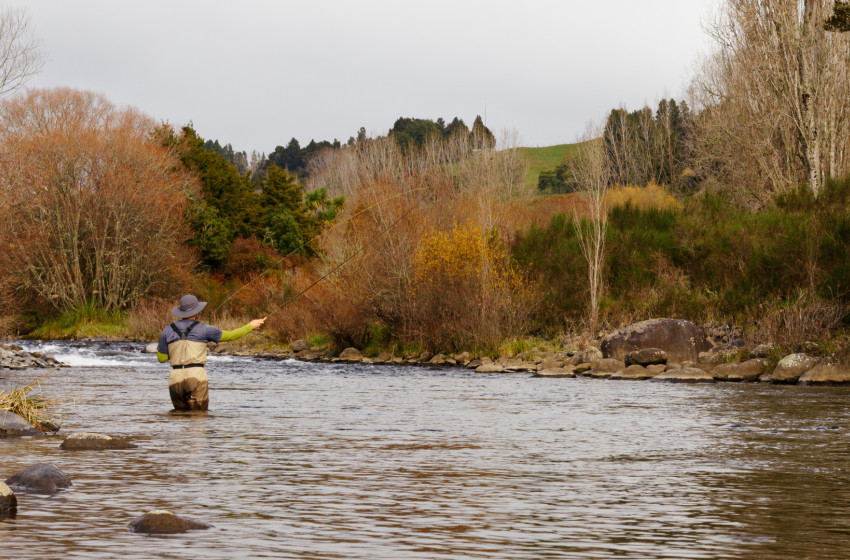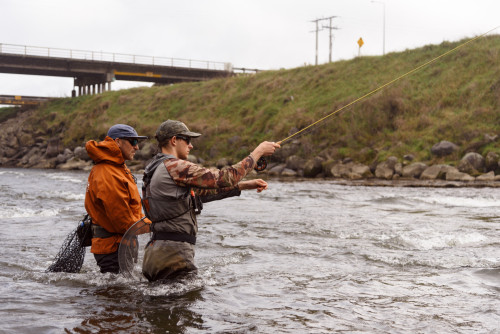Starting out from scratch
- 27/08/2024

Written by Beau Jarvis-Child
A change was afoot at the Hamilton Fish & Game office. The phone call had been made, the dotted line signed, the position filled. But the new officer, fresh off the plane from Wellington, was not an angler, let alone a fly fisher. He could barely tie two bits of line together.
Emails were sent out with haste: “Welcome to the team. Let me know if you want to have a crack at fly fishing before you start.” I was thrilled. I was about to begin my dream job, and I had been welcomed into the world of fly fishing.
I was very fortunate to have Nigel Juby (Auckland-Waikato Fish & Game Council chairman and lifelong fly fisher, who has completed his goal of fishing all 45 rivers in the region) take me out for the first time. It's probably fair to say he has perfected the art of getting people hooked on fishing as much as he has hooking fish.
Nigel’s trick to making fly-fishing fun for a newcomer is to knock over the two main hurdles of the pursuit – a deciding what gear you need, and figuring out how to use it.
After butchering some practice casts in the garden, he set up my rod for me and, by the river, offered some reassurance: “Your cast doesn’t need to look pretty – just try to get your fly to land over there.” A small rainbow took my fly, and that was that.
After that, I just needed my own gear - an appropriately weighted rod with a reel and appropriate fly line, backing, tippet, leader, fly, and nymph. After many hours straining my memory for what Nigel had told me and scouring forums and fishing websites, I had it all figured out. ‘Buy Now.’
“That’s not what I would have gotten,” smiled Nigel, the next time I met him[1], “but it will be fine.”
I was not dismayed. I thought my new 6wt rod was brilliant, although a tad strong. It sent the tincy fish cartwheeling over my shoulder at every strike. But I had learnt my lesson. While there are plenty of brilliant resources online, I would have been much better off asking him or the staff at my local fishing shop.
In fact, the only thing that kept me going while deciphering hook sizes, tippet strength and leader formulas was the memory of the small rainbow at the end of my line. Which brings me to Nigel's third trick: when people talk about getting addicted to fly fishing, they don’t talk about the first time they went, they talk about the first fish they caught. Nigel knows this, which is why he took me to a stream where he knew there would be fish, small fish, that are not impossible to catch.
As Nigel puts it, it might not be the best region for trout, but it's undoubtedly the best for learning. To date, Nigel and his equally keen son, Leo, have introduced me to the Kaniwhaniwha, Waipa, Waimakariri and Waipapa, which all have offered a successful day out in the Auckland-Waikato region.
You don’t have to talk to many anglers to garner that if your father isn’t into fly fishing, there's a slim chance you will be. The pursuit is passed down from generation to generation. I’m not surprised. Getting started in fly fishing is a daunting task. There are so many things to learn, to buy, to not buy, to splurge on, to save on. And this is before you even get your feet wet. If it wasn’t for the new job, I may well have lived a troutless life…
After a fruitless day fishing the Whakapapa on my own, I was excited to see that Ollie Bassett (national champ, who is making ripples on the world stage) was running clinics to fund his trip to compete in France. I already knew my answer when work suggested I take part. There was just one catch. Ollie was teaching what he knows best – euro nymphing, a discipline of fly fishing on the rise due to its popularity and success in the competitive space.

Ollie Bassett shows participant James Prime his euro-nymphing technique
Learning euro nymphing while barely grasping orthodox fly fishing was a bit like unscrewing the trainer wheels on a dirt bike and jumping into the velodrome. I had barely scratched the surface and was embarking on what felt like a whole new pursuit – one that, as I learned at the clinic, fly fishers were adopting because they were broadening their horizons after mastering the traditional approach.
The clinic was split into five memorable parts:
- Theory: What, when, where, why and how of euro nymphing.
- Morning tea: freshly baked brownies, bacon and egg pie, hot coffee.
- Demonstration: Ollie in the river casting and describing his strategy (featuring the biggest brown trout I’d ever seen.
- Lunch: gourmet sausages, small talk about past and future comps.
- Practice: Ollie going between us, giving well-needed tips and helping with tangles.
As a complete beginner, you couldn’t ask for more. Before we got given our rod[2], reel (“your usual fly reel will be fine to start”) and had our leaders[3] set up, we had learnt the ins and outs of why and how to use them.
Having none of the euro-nymphing kit, it was reassuring to hear “entry-level rods (think $200) are brilliant nowadays” and “use your current fly reel for starters”. Ollie's approach to fishing is so humble he makes you feel like you could do it too.
Now, I’m no fool – if the 10,000 -hour rule is anything to go by, there are about 9995 hours that separate Ollie and me as anglers. But I’m encouraged. As Ollie shares the ‘rubber band trick’ you get the impression that the gear – something that feels so overwhelming and exorbitantly expensive when you're starting – isn’t too intimidating or exclusionary at all.
If you are fortunate, like me, to have had a friend, family member or colleague introduce you to the pursuit, then I do not doubt that a clinic will be time and money well spent. How could you not love a day by the river, exploring a new discipline and picking up all the cool tips and gadgets Ollie has collected from his time in international competitions?
However, as someone new to this, I can’t help but feel that Ollie's clinic is the perfect opportunity for those who want to give the pursuit a go but lack a friend or family member to take them. After a day with Ollie, ‘euro nymphing’ – something that initially sounded rather strange and exotic – turns out to be just another fun way to catch trout.
Fly fishers are a generous and enthusiastic bunch, and I am so grateful to Nigel and Ollie for sharing their passion. If you want to give fly fishing a go, I’d implore you to find someone to take you out (fishing clubs are another good place to start). I know I’ll be keeping an eye out for Ollie’s next clinic. Likewise, if you’re a seasoned angler, reach out to friends and colleagues. A simple introduction may be all they need.
[1] Getting started, Nigel recommends a 4wt 9' rod for the North Island streams set up with backing → floating fly line → 9' 4x tapered leader → 1m of 5lb tippet → dry fly → 50-70cm tippet → nymph
[2] Euro nymphing rod – a 3wt, 10 ½' – an all-rounder akin to a 6wt, 9' fly rod)
[3] Backing → 55mm euro nymphing “short” fly line → 10ft non-tapered leader → 3ft bicolour indicator → 3ft tippet → first fly (dropper style) → 2ft tippet → second fly (heavier of the two)
Nigel's five tips to hook the angler
- Practice basic overhead casting on land - Short casts catch fish.
- Go somewhere easy - Lots of fish, easy wading, not too many trees.
- If possible, swing wet flies - A downstream current fixes bad casts; upstream nymphing is much more difficult.
- Discuss how to hook and land fish in advance.
- Don't overcomplicate anything – Set the framework, and the student can fill in the gaps later.